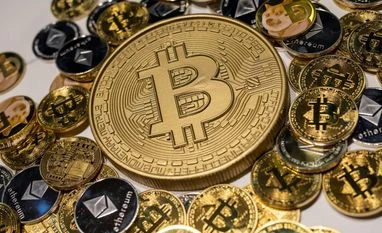Bitcoin in April 2024: All you need to know about Halving event and impact
On Monday, Bitcoin traded at $65,000-mark as against the $63,000 level on Friday. Historically, Bitcoin has rallied post halving, will the trend continue? Here's all you need to know
)
Photo: Bloomberg
Listen to This Article
Just days after Bitcoin so-called 'Halving-event' the cryptocurrency was quoted at $65,125 levels as of 09:00 AM IST on Monday. The maximum supply for Bitcoin remains capped at 21 million, while current circulating supply stood at 19.69 million, thus underlying the limited scope for fresh bitcoins.
Crypto enthusiasts and investors were waiting eagerly for this moment, which historically has sparked a bull-run in the underlying post the event. However, analysts believe it's still too early to tell how the market will evolve in the next few weeks.
Bitcoin has gained as much as 54 per cent so far this calendar year, and has zoomed 136 since in the last 52 weeks. The present market capitalisation of Bitcoin stands at $1.28 trillion.
Here's why everyone is talking about Bitcoins
The much-awaited 'Halving-event' for Bitcoin took place on Friday, post which the cryptocurrency traded on a steady note around $63,000-mark. In Friday's halving, the rate of new bitcoin created roughly every 10 minutes was 3.125.
Also Read
What is the 'Halving-event' for Bitcoin?
The 'Halving-event' happens roughly every four years or after 21 million tokens are validated. This is done, in order to cap supply of 21 million tokens. It has been in place since its inception, designed by its creator Satoshi Nakamoto.
Last Friday was the fourth such 'Halving-event' in the history of Bitcoin, which was launched in January 2009.
What happened post previous Halving?
Historically trend shows that Bitcoins have logged smart gains post the 'Halving-event' in the past.
Post the halving in May 2020, the value of Bitcoin appreciated by 12 per cent in the following week and 659 per cent in the following 12 months.
In July 2016, Bitcoin gained 1.3 per cent in the very next week post 'Halving-event', and thereafter plunged and then rallied sharply.
Market regulators have repeatedly warned that Bitcoin is a speculative market driven by hype and one that poses harm to investors.
Experts too argue that the 'Halving-event' alone cannot be a sole reason for subsequent price rises.
Reports quoting analysts at JPMorgan and Deutsche Bank stated that the impact of the 'Halving-event' was mostly baked in, and there isn't likely to be a large upward movement in its aftermath.
In the current market scenario, analysts believe that the ongoing geopolitical crisis, high Fed rates and the upcoming US Presidential elections could weigh on the market sentiment going ahead.
More From This Section
Don't miss the most important news and views of the day. Get them on our Telegram channel
First Published: Apr 22 2024 | 10:49 AM IST
